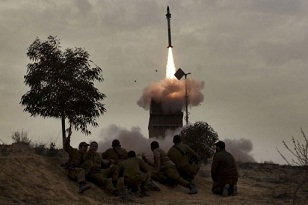A cease-fire called by South Sudan’s leadership seemed to be holding on Tuesday. Civilians in Juba ventured out of make-shift shelters for the first time in days. Many took advantage of the truce to leave the capital.
On Tuesday, President Salva Kiir reaffirmed his intention to negotiate a return to peace with former rebel leader Riek Machar. According to a presidential spokesman, the two leaders and rivals spoke by phone. On Monday evening, both Kiir and, separately, Vice President Machar ordered their supporters to cease hostilities, following strong condemnation from the international community.
Many Juba residents used the lull to try and get out of town, signaling some doubt that the truce will hold. Attempts by both sides of the conflict to put the blame for the renewed fighting on their opponents do not augur well for peace. On Thursday, a convoy of soldiers loyal to Machar opened fire on a checkpoint in Juba manned by troops from the Kiir faction. South Sudan‘s ambassador at the African Union James Pitia Morgan told DW that both parties had decided on the need for road checkpoints: “He (Machar) knows that this had been agreed on. But when vehicles of the opposition were stopped to identify the occupants, “they opened fire on our soldiers, and they killed five of them.” But Machar’s faction accused Kiir’s soldiers of firing on an opposition convoy.
People are fleeing
At least 36,000 people have fled their homes since Friday, according to the UN. Many are trying to reach UN bases. How secure these bases are is open to question: eight people were killed and 67 injured at so-called “Protection of Civilian” sites since Sunday. Two Chinese peacekeepers were also killed and others wounded. The UN agency for refugees (UNHCR) has called on neighboring countries to keep their borders open to South Sudanese seeking asylum. The South Sudan says 272 people have been killed, including 33 civilians.
On Tuesday, UN Secretary General Ban Ki-moon appealed to the UN Security Council for targeted sanctions against those involved in the fighting. He also called for a strengthening of the UN mission in South Sudan (UNMISS) with attack helicopters and an immediate arms embargo on South Sudan. Amnesty International ‘s Elizabeth Deng said “an embargo, which should cover the supply, sale and transfer of weapons, ammunition and military vehicles, will reduce the likelihood of all disagreements resulting in widespread death and destruction.”
Fears of a return to civil war
Many countries, including Germany, have called on their citizens to leave South Sudan, while embassies and non-governmental organizations like Doctors Without Borders are pulling out their staff. Uganda announced that it will send troops to the South Sudan to help evacuate its citizens.
Fear of civil war
DW correspondent Patricia Huon in Juba describes the situation in the city as being calm: “Life is coming back slowly but the situation is still very tense”. Residents are not sure if the troops are under control by the leadership. While there is hope, people are afraid that the civil war scenario “will be repeating itself”.
The conflict that broke out in December 2013 and lasted for two years was notorious for the degree of violence used against the civilian population. This included ethnic massacres, rape, murder and the use of child soldiers. An August 2015 peace deal was supposed to end the conflict but has so far failed to do so, despite the return of rebel leader Machar to Juba in April to join a government of national unity alongside his rival Salva Kiir.
Tens of thousands have died in the violence since independence in 2011, while close to three million were forced from their homes. Nearly five million South Sudanese are surviving on emergency food rations. Adding to the humanitarian crisis is an economic one, which has led to a collapse of the currency and has allowed inflation to spiral out of control. The country’s oil industry, its only revenue source, lies in tatters.


